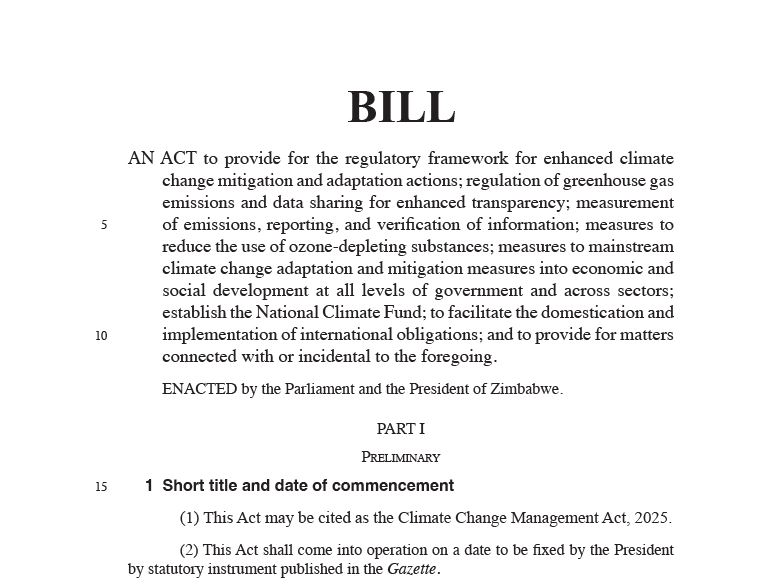Zimbabwe has gazetted the Climate Change Management Bill, 2025, establishing a regulatory framework for climate change mitigation and adaptation actions.
The bill, approved by Cabinet and now awaiting parliamentary debate, seeks to consolidate power and responsibility for all climate-related matters under the Climate Change Management Department.
The proposed legislation establishes the department as the primary body for enforcing climate policy, to be led by a director.
According to the bill, gazetted last week, the department will have the authority to manage the implementation and administration of all climate change initiatives.
The move is designed to create a more unified legal framework, addressing the fragmentation of responsibilities previously spread across different institutions and laws.
The Climate Change Management Department will be responsible for implementing and administering the Bill, with specific units for transparency, ozone protection, loss and damage, and carbon trading.
The Bill provides for the regulation of greenhouse gas emissions, including data collection and measurement in tonnes of carbon dioxide equivalent. It provides for the establishment of a National Climate Fund to finance climate change projects and activities.
The Bill mandates both public and private institutions to integrate climate change measures into their systems and plans. It also imposes duties on ministries, government departments, and agencies to appoint dedicated staff and focal officers to mainstream climate change activities.
The Bill aims to facilitate the implementation of international obligations related to climate change and ozone layer protection. It also provides for a fair contribution to global efforts to limit the temperature increase to 1.5°C above pre-industrial levels.
The Bill establishes a framework for a carbon trading system and a Zimbabwe Carbon Credit Registry. The Zimbabwe Carbon Markets Authority will be established within the Climate Change Management Department to register and monitor carbon trading projects.
The Minister, in consultation with the Minister responsible for Finance, is empowered to provide incentives to persons who advance climate change adaptation and mitigation actions.
A key feature of the Bill is its strong emphasis on community engagement and stakeholder consultation. The document outlines mandatory consultation plans for all projects, requiring applicants to detail how they will engage with communities, including those who may be indirectly affected.
The Bill also mandates specific measures to ensure the inclusion of women and vulnerable community members in the decision-making process, a provision aimed at fostering equity and transparency.
Additionally, it introduces a formal grievance and redress mechanism, providing a clear avenue for the public to seek recourse for climate-related issues.
Discover more from CLIMATE BRIEF
Subscribe to get the latest posts sent to your email.




